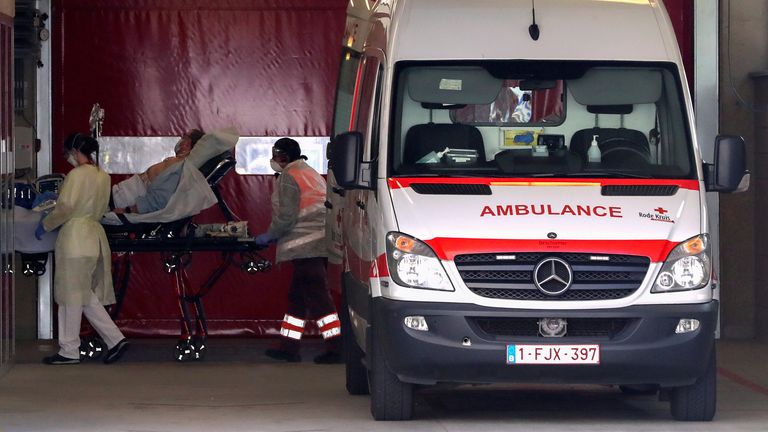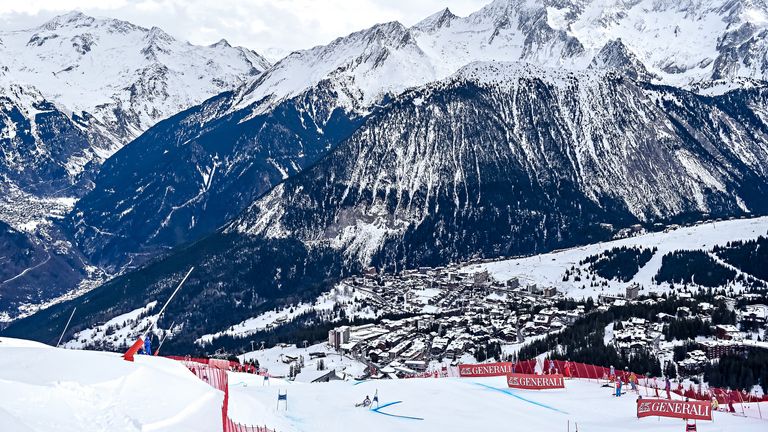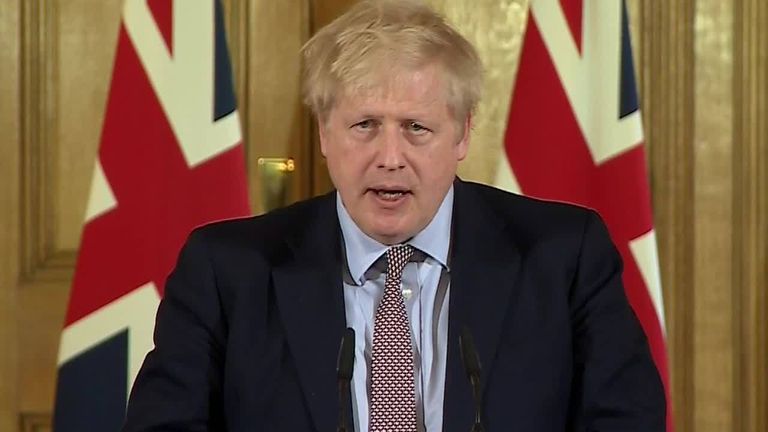Coronavirus: Leaders agree to close EU's external borders in virus battle
The European Commission chief says: "The enemy is the virus and we have to do our utmost to protect our people and our economies."
Tuesday 17 March 2020 21:24, UK
Leaders in the European Union have agreed to close the bloc's external borders to most non-EU citizens for 30 days to prevent the spread of coronavirus.
Europe has been called the new epicentre of the global outbreak by the World Health Organisation and many countries are already on lockdown, with people's movement restricted.
Italy has suffered more than 2,500 deaths - the highest number outside China - where COVID-19, the disease caused by coronavirus, first emerged late last year.
As well as shutting external borders, EU leaders have agreed to set up fast-track lanes at countries' internal frontiers to keep goods flowing across the continent.
Ursula von der Leyen, the president of the European Commission, said it would be up to European nations to enforce the closures.
She said: "The enemy is the virus and now we have to do our utmost to protect our people and to protect our economies.
"We are ready to do everything that is required. We will not hesitate to take additional measures as the situation evolves."
Under the plans which were originally proposed on Monday, long-term residents, family members of EU nationals, diplomats and those on the frontline of dealing with the crisis would be exempt, as would UK citizens.
Also exempt would be freight drivers, Mrs Von der Leyen said, adding: "The flow of goods to the European Union must continue to secure the supply of goods, including essential items such as medicine, but also food and components that our factories need."
On Monday evening, French President Emmanuel Macron announced that from Tuesday new measures in France would see a restriction in border movement.
French people on holiday will be able to come back to France and those living abroad were told to contact embassies and consulates who will help them be repatriated.
The UK's Foreign Office said the UK is not included in the closure and told Britons in mainland Europe to continually monitor travel advice as it is changing rapidly.
Mr Macron also announced major support for businesses, including not having to pay taxes and bills, so "not a single French person will be left without resources."
The second round of municipal elections will be suspended and any new reforms going through parliament will be halted from Wednesday, he said.
:: Listen to the Daily podcast with Dermot Murnaghan on Apple Podcasts, Google Podcasts, Spotify, Spreaker.
Mr Macron warned the French people that "movements will be very strongly reduced" for 15 days after chiding them for not complying with earlier measures drawn up to reduce the spread of coronavirus.
Nationwide restrictions are being enforced on how far people can go from their homes, and for what purpose, with transport "heavily reduced" from lunchtime on Tuesday for at least two weeks, Mr Macron said.
He said people will no longer be able to have family get-togethers and "meeting your friends in the park, the street will no longer be possible".
In other coronavirus developments:
- More than 179,000 people have been infected worldwide and more than 7,000 have died
- Over 78,000 have recovered, most in China
- Spain becomes fourth-most infected country after China, Italy and Iran with more than 9,191 cases and 309 deaths
- Canada, Norway and Denmark among countries that have announced emergency border closures
- Foreign Office advises British nationals against "all but essential travel"
- UK residents told to avoid "all necessary contact" with others and to avoid pubs, theatres and restaurants
- US implements strict new measures after cases climb to nearly 4,500, with at least 82 deaths
- McDonald's, Taco Bell and Starbucks among chains to close seating areas in US
- Hong Kong, Greece and New Zealand among countries to quarantine visitors for 14 days
- India tightened its borders, while Greenland and Somalia reported first cases
- Italy reports jump in infections, up more than 3,000 to 27,980 with 2,158 deaths
- Cruise ships stranded in Caribbean, South America and Europe after new border restrictions
Mr Macron has demanded all French companies make it possible for employees to work from home from Tuesday.
He said if anybody does not respect the staying at home rules "sanctions will be imposed", but he did not specify what they would be.
Going further than any other government to protect his country's economy, the president said: "There's not a single company, whatever its size, will go bankrupt, not a single French person will be left without resources."
The state would provide 300 billion euros (£329bn) in loans to companies and is looking into waiving tax payments, he said.
For small companies, he said they will have nothing to pay from a fiscal point of view, with gas, electricity and rent payments to be suspended.
He said partial unemployment benefits will be increased and a solidarity fund will be created by the state, with a suggestion of support from the regions, for "entrepreneurs, artisans, craftsman", Mr Macron added.
The president also announced widespread support for health professionals, with workers able to use taxis and hotels paid for by the state and their children to be looked after in creches and schools for free.
Masks and hand sanitisers will be provided to every health professional, with the first batch being sent out to pharmacies in the worst-hit regions on Tuesday then other areas on Wednesday.
An army hospital in the Alsace region will also be opened up for coronavirus patients who will be moved there from the most affected regions to relieve hospitals struggling to cope with the volumes.








